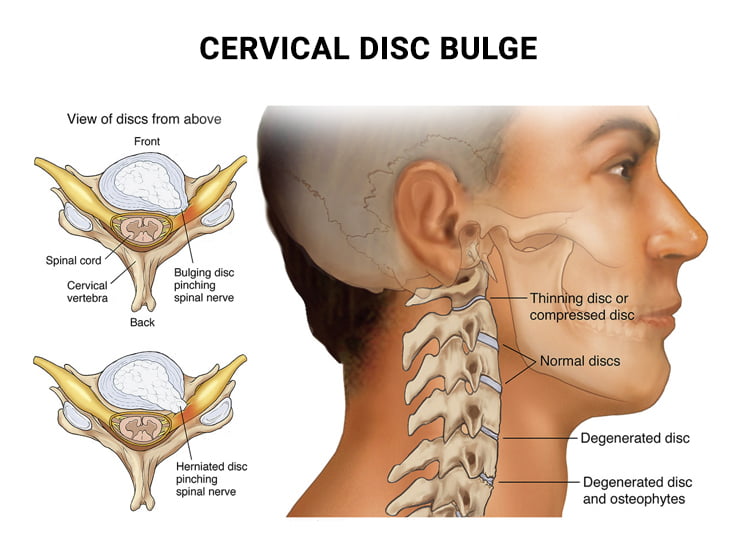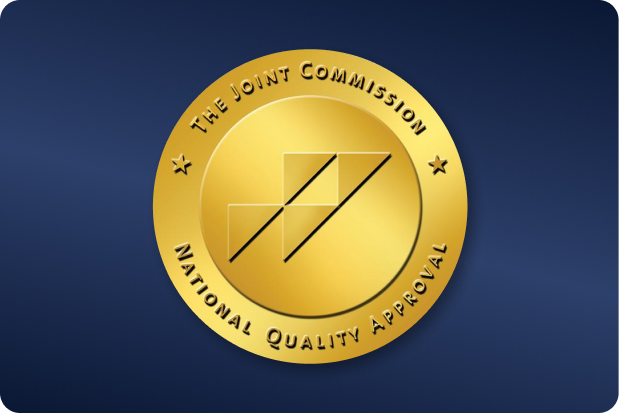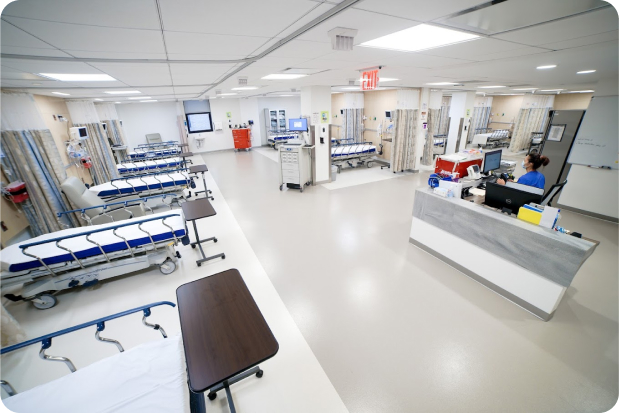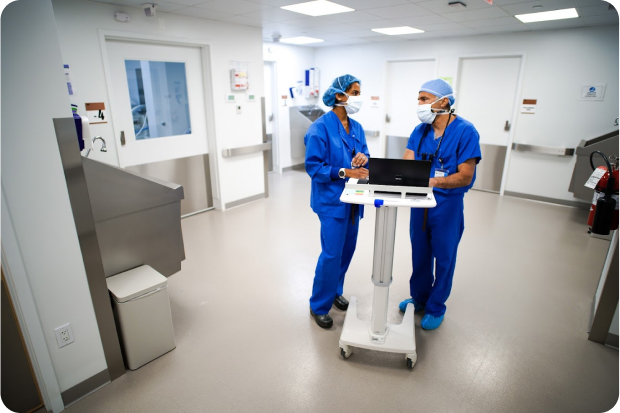 OUR LOCATIONSCall to book (212) 604-1300
OUR LOCATIONSCall to book (212) 604-1300
 OUR LOCATIONSCall to book (212) 604-1300
OUR LOCATIONSCall to book (212) 604-1300
Neck pain is a common disorder that affects up to 50% of the adult population every year. Most of the time, its symptoms are acute and they can get better with rest and conservative care. However, in cases of chronic neck pain, you may need to get a more comprehensive diagnosis since it could be related to a bulging disc injury in your cervical spine.
So what causes cervical disc protrusion and what can you do about it? Cervical discs often bulge or slip out due to natural degeneration, acute trauma, and other lifestyle factors such as poor posture and being overweight. For moderate bulging disc symptoms, it can be remedied with pain medication, cortisone injections, cervical traction, and physical therapy. Spine surgery can also be done in cases of severe pain to directly remove the damaged disc.
A bulging disc isn’t an uncommon condition, and it’s usually one of the primary sources of neck and arm pain. The good news is that not all cases of the cervical bulging disc are a serious concern. This disorder occurs when the nucleus inside the intervertebral disc shifts and pushes out of its outer layer. This can cause the disc to bulge out of its position and expand into the spinal canal.
This condition is often confused with a herniated cervical disc, but it’s important to know the difference between the two so you can get the proper treatment. One significant distinction is that a bulging disc doesn’t always affect its entire perimeter, while cervical disc herniation usually involves damage or tear that causes the nucleus to leak directly into the spinal column.
With cervical herniation, there’s a high chance that it can irritate the nearby nerve root and cause painful inflammation which can lead to chronic neck pain. When diagnosed early, a cervical bulging disc is easier to treat and you can prevent its symptoms from worsening and stop it from herniating.

To better understand how a bulging disc can cause neck pain, let’s look at the anatomy of the spinal cord. The spine is generally divided into 3 main segments:
The cervical spine or neck comprises 7 vertebral bones. These bones are stacked on top of each other and in between them lies the cervical discs. There are also other important groups of muscles and ligaments, such as the trapezius, deep cervical flexors, and anterior and posterior ligaments, which help stabilize your neck.
There are a total of 6 spinal discs located between each of the 7 cervical vertebrae. These discs are typically round-shaped and have 2 basic components:
A healthy cervical spine allows for greater flexibility, support, and movement for the neck and head. Unfortunately, it’s also more vulnerable to unforeseen accidents which can cause the discs to protrude or herniate. Here are some possible causes of cervical disc protrusion:
One of the leading causes of cervical injuries is blunt trauma or accidents to the neck area that can cause the disc to physically tear or slip from its position. A primary example is having whiplash from a car accident. When you’re involved in a sudden car collision, your head will abruptly move forward and backward. This can cause the neck muscles to extend beyond their normal range and result in a bulging or ruptured disc.
Neck pain is also commonly experienced by individuals with poor posture. If you’re constantly slouching or bending forward, your neck experiences a lot of muscle strain and there’s increased pressure in the cervical discs which can lead to bulging or herniation.
Like any other structure in the body, the spinal discs need to be hydrated so they can maintain their flexibility and perform their optimal function. However, as you age, the discs lose water which can lead to changes in their normal shape.
This natural degeneration can result in bulging or herniated discs and cause symptoms of muscle weakness, numbness, and neck pain. It can also cause some spine-related conditions like spinal stenosis or the narrowing of the spinal canal, arthritis, and sciatica pain.
Excess weight can also affect the natural curve of your spine and it can make you more prone to leaning forward which can contribute to a bad posture. It can also add pressure to the nerves and discs in the cervical spine which can lead to symptoms of neck pain, muscle tightness, and strain.
There are also additional factors that can increase your risk of having bulging or slipped discs in the neck. If you want to prevent this condition and keep your cervical spine and discs healthy, you should be aware of these possible factors:
A cervical disc bulge is commonly associated with sharp or burning pain in the neck, arm, and shoulder. It can also lead to other uncomfortable symptoms such as:
You don’t have to live with a bulging disc when there are many possible treatments that can help provide cervical pain relief. Here are some of the common treatment options for a bulging disc in the spine:
Don’t let your bulging disc pain get worse and get the immediate care and treatment that you need. Stop searching for a “neck pain doctor near me” and call our highly experienced neck experts. At New York Pain Care, we have specialists who can provide an accurate diagnosis of your condition and create a comprehensive treatment plan that will help you get better quickly.
Our pain management team is trained in the best non-surgical methods that will provide bulging disc pain relief. We can also offer specialized sports medicine treatments, physical therapy, and chiropractic care. Call us today to request a consultation and know more about how we can help you recover from your pain.






